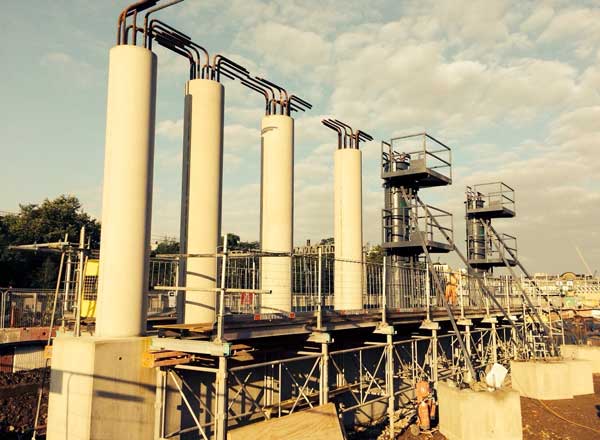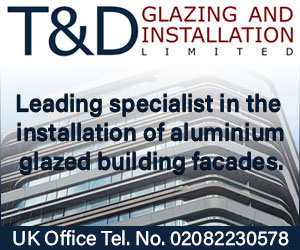What is Steel Formwork?
Steel formwork is a type of formwork that is used to shape and support concrete structures during construction.
It consists of panels made from steel, which are assembled on site to create the desired shape of the concrete element.
These Panels can either be used to form intricate shapes, walls, bridge piers or columns and many more applications.
What are the benefits of using steel column formwork?
One of the primary benefits of steel column formwork is its high level of accuracy and consistency.
Its smooth surface finish and precise dimensions allow for a better fit with other construction materials therefore resulting in a stronger and more durable structure.
Steel column formwork is also extremely durable and can withstand the rigors of construction sites. It is resistant to damage from weather, moisture, and other environmental factors, and can maintain its structural integrity for many years. This makes it a more cost-effective choice compared to plastic and cardboard formwork, which may require frequent repair or replacement.
Breakdown of benefits:
Quality
Steel column formwork provides a high level of accuracy and consistency in the finished concrete columns. Its smooth surface finish and precise dimensions allow for a better fit with other construction materials, resulting in a stronger and more durable structure.
Repeat operations
Steel column formwork can be easily disassembled and reassembled for multiple uses, making it ideal for projects with multiple column pours. This not only saves time and labour costs, but also reduces waste compared to single-use formwork systems.
Sustainability
Steel column formwork is fully recyclable, making it an environmentally friendly choice. Its long lifespan and reuse potential also contribute to its sustainability, as it reduces the need for frequent replacement and disposal.
Transportation and logistics: Steel column formwork is lightweight and easy to transport, making it more efficient to move from one job site to another. It also requires less storage space compared to heavier formwork systems.
Durability
Steel column formwork is extremely durable and can withstand the rigors of construction sites. It is resistant to damage from weather, moisture, and other environmental factors, and can maintain its structural integrity for many years. In contrast, plastic and cardboard formwork may become damaged or weakened over time, requiring frequent repair or replacement. Timber formwork, while also durable, is prone to warping and splitting, which can affect the accuracy and quality of the finished concrete columns.
Fire resistance
Steel column formwork is non-combustible and has a high melting point, making it resistant to fire. This is an important safety consideration on construction sites, where the risk of fire is always present. Plastic and cardboard formwork, on the other hand, are flammable and can contribute to the spread of fire in the event of an accident. Timber formwork, while also combustible, has a lower melting point than steel and is more prone to fire damage.
Ease of use
Steel column formwork is easy to handle and assemble, thanks to its lightweight and modular design. Its smooth surface and precise dimensions also make it easier to achieve a smooth and uniform finish on the concrete columns. Plastic and cardboard formwork can be more difficult to work with, as they may have rough or uneven surfaces and may require additional bracing to maintain their shape. Timber formwork can also be cumbersome to handle and may require additional time and labor to assemble.
Overall, steel column formwork offers numerous benefits over plastic, cardboard, and timber alternatives. Its superior quality, repeatability, sustainability, and logistical advantages make it a top choice for construction professionals looking to achieve high-quality, consistent concrete columns.
Steel circular column formwork is typically more durable and long-lasting than cardboard alternatives. It can be used multiple times and is less likely to become damaged or deformed during the concrete pouring process. Additionally, Steel is also more resistant to water and other elements, making it a better choice for outdoor construction projects.
In terms of carbon footprint, steel is typically heavier and requires more energy to produce and transport than cardboard, which is made from a renewable resource and can be easily recycled. However, steel column formwork is reusable and can offset the carbon footprint over time.
Ultimately, the choice of formwork will depend on the specific needs of the project, including budget, project duration, and the size and complexity of the column being formed.
www.formwork.co.uk
Time and date
CONSTRUCTION DIRECTORY
Latest Construction News
29/11/2024
Helmsley Group secured planning permission for the final part of its Coney Street Riverside masterplan which will bring much needed residential space to the city and realise a 50-year ambition to reconnect York to its riverfront. With work expected to start in the summer of 2025, this approval ...
29/11/2024
Network Space Developments (NSD) has received planning approval from Manchester City Council for a major redevelopment project at its Welcomb Street site in Openshaw, Manchester. The four-acre site, acquired by NSD in 2022, will be transformed into an extension of the adjacent City Works Business ...
29/11/2024
Work has commenced on a new lighting scheme designed to create brighter streets in Digbeth, close to HS2's Birmingham Curzon Street station. The Birmingham City Council project – funded in part through a £210,140 investment from HS2's Business and Local Economy Fund (BLEF) – will see the ...
29/11/2024
Building work has commenced on 14 new modern one-bedroom apartments at Ludwick Green in Welwyn Garden City. The apartments are being developed as part of Welwyn Hatfield Borough Council's (WHBC) Affordable Housing Programme, and its commitment to building new social and affordable homes. Ludwick ...
29/11/2024
River Capital has invested £500,000 in Liverpool-based M&E engineering consultancy, Steven A Hunt & Associates Ltd. The funding was structured to facilitate a management buyout (MBO) by the senior management team of Neil Baines, Anne King, Dave Kelly and Dominic Sibbring from founder Steven Hunt, ...
29/11/2024
Henley Restoration and Remedials has been chosen to carry out extensive external and structural repairs on the Grade II-listed Phoenix Mill, the oldest building in the Rutland Mills complex. Originally a grain store, Phoenix Mill later became a corn mill in the 19th century before transitioning ...
29/11/2024
Dorset County Council's North East Technology Park (NETPark) has been allocated over £11 million towards its expansion. The North East Combined Authority's Cabinet has approved £11.3m of funding for the Sedgefield site from its £160m flagship North East Investment Zone (NEIZ), which aims to drive ...
29/11/2024
Laing O'Rourke, in collaboration with Barnsley College and T3 Training & Development, have opened the UK's first dedicated modern methods of construction (MMC) training facility. The first of its kind training centre represents a groundbreaking step in addressing the UK's construction skills ...
29/11/2024
Aqua Direct are keen to share their support for the Urgent Funding campaign from St Giles Hospice. With a national hospice funding crisis, they need your support more than ever ...
29/11/2024
As we approach the end of 2024, we have been reflecting on what an action-packed year it has been. We have worked with some fantastic clients and sites across the country. We started from our base in Essex over ten years ago, and the demand for trackway has certainly been at its highest ...


















